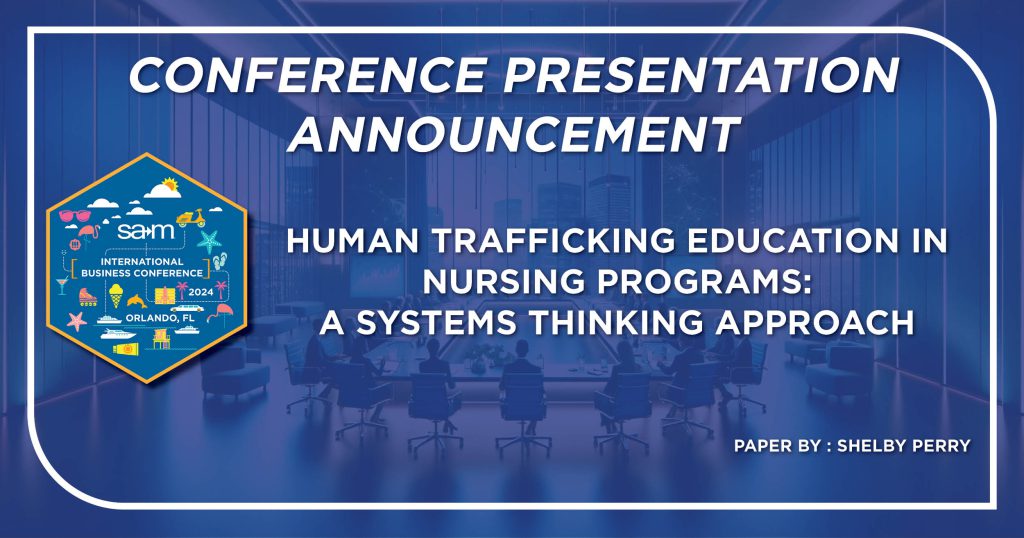
The programming committee for the 79th Annual SAM International Business Conference is pleased to announce the acceptance of the presentation, Human Trafficking Education in Nursing Programs: A Systems Thinking Approach by Shelby Perry.
We are excited to announce a groundbreaking academic paper presentation at the upcoming SAM International Business Conference, which promises to shed light on a critical yet often overlooked public health issue: human trafficking. This comprehensive study not only highlights the grim reality of human trafficking across the United States but also emphasizes the pivotal role that nursing education plays in combating this scourge.
Human trafficking, as defined by the Department of Homeland Security, involves the use of force, fraud, or coercion to exploit individuals for labor or commercial sex. This complex issue transcends racial, gender, socioeconomic, and educational boundaries, making it a pervasive challenge within our society. The study points out that certain populations, including migrants, those with substance use issues, and individuals experiencing homelessness, are particularly vulnerable to trafficking. It also reveals a startling statistic from the Polaris Project: in 2021 alone, over 10,000 situations of human trafficking were reported to the U.S. National Human Trafficking Hotline.
At the heart of this research is the critical examination of the role that nurses and healthcare providers play in identifying and assisting victims of human trafficking. Despite being on the front lines and often being the first professionals to interact with victims, nurses face significant challenges in recognizing and responding to the signs of trafficking. The study argues that the education system, particularly undergraduate nursing programs, is at a strategic point to initiate change by incorporating human trafficking education into their curriculum.
The methodology of the study utilizes systems thinking to understand the complex dynamics between human trafficking and nursing education. This approach allows for a holistic view of the issue, recognizing the interconnectedness of various system components and the emergent properties that arise from these interactions. Through a meticulous literature review, the researchers have developed a systems diagram that visually represents the intricate relationships and interactions within this context.
The implications of this research are profound. The study identifies nursing education as a crucial intervention point and proposes the integration of a human trafficking educational module into undergraduate nursing programs. This module, designed to be both practice-based and transferable, would cover essential topics such as key concepts and terms, health impacts, risk factors, screening tools, and victim-centered care approaches.
As we prepare for this significant work to be presented at the SAM International Business Conference, we invite educators, healthcare professionals, policymakers, and all stakeholders to join us in exploring the findings and discussing strategies for implementing these crucial educational changes. Together, we can empower future nurses with the knowledge and tools needed to make a tangible difference in the lives of those affected by human trafficking.
This presentation not only aims to enlighten but also to inspire action and foster collaboration across disciplines to address human trafficking effectively. We look forward to your participation in this important conversation at the conference.
Join us online or in person at SAMIBC 2024 and see this great presentation and many more March 19 – March 23, 2024. For registration information visit www.samnational.org/conference.
